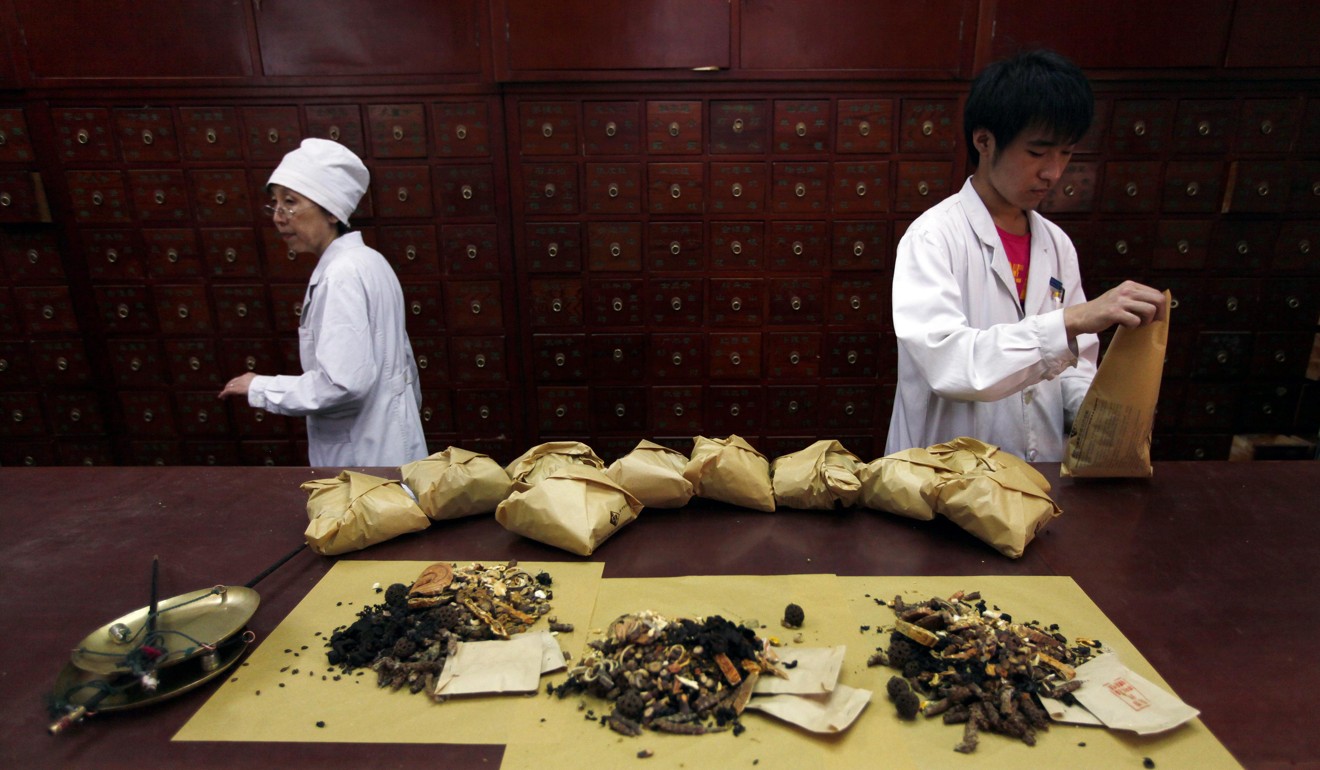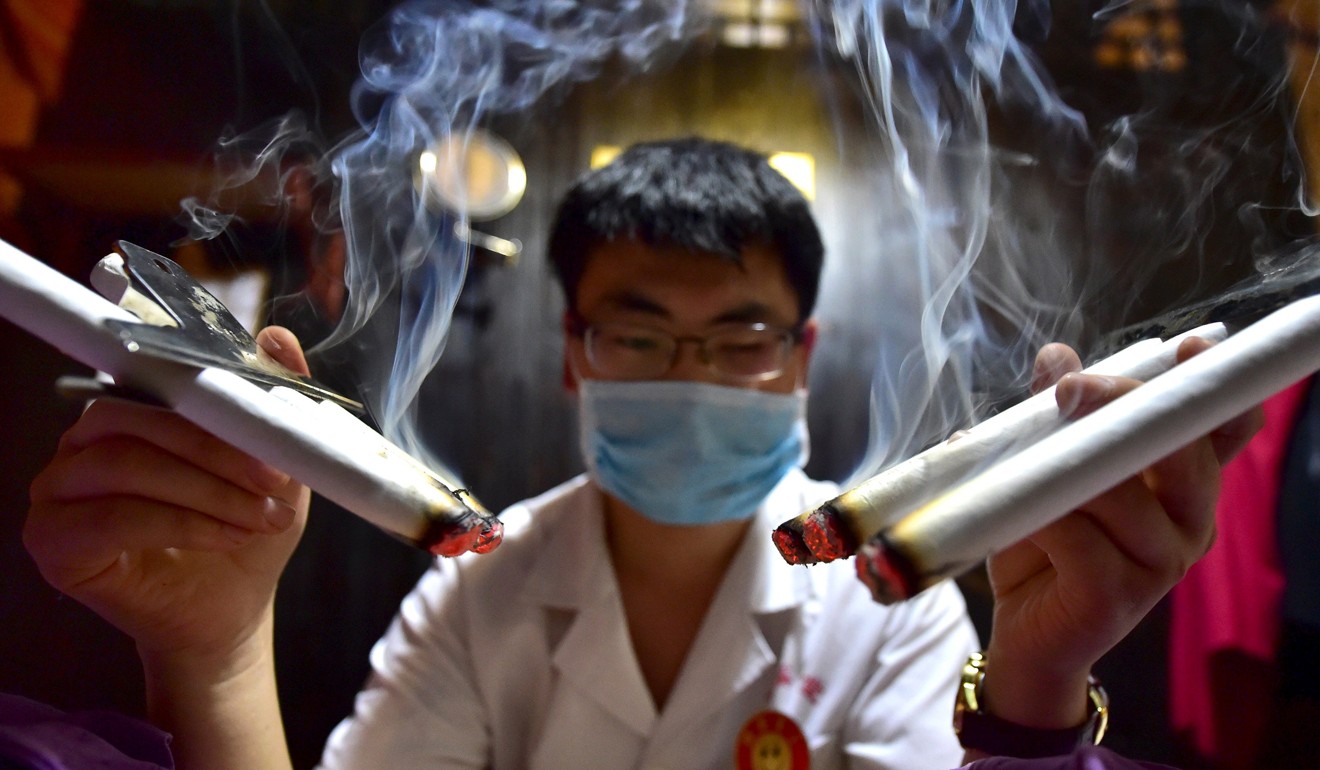{UAH} Traditional Chinese medicine closes in on US$50 billion market with long-awaited nod from WHO
Traditional Chinese medicine closes in on US$50 billion market with long-awaited nod from WHO
The World Health Organisation is including a chapter on China's ancient medicine programme in its influential book classifying thousands of diseases
 Zhuang PinghuiUPDATED : Saturday, 29 Sep 2018, 11:24PM
Zhuang PinghuiUPDATED : Saturday, 29 Sep 2018, 11:24PM
When Chinese President Xi Jinping gave the World Health Organisation a bronze statue last year showing acupuncture points on the body, the move was widely seen as an expression of Beijing's ambition to win global acceptance for traditional Chinese medicine (TCM).
Now, that dream may be moving closer to reality.
TCM, which originated in ancient China and has evolved over the years, is set to receive its first-ever official endorsement from the WHO next May at the World Health Assembly when the international public health agency dedicates a chapter to it in its 11th version of the "International Statistical Classification of Diseases and Related Health Problems".
A classification system on traditional medicine will be featured in Chapter 26 of the work, which provides a system of diagnostic codes for classifying thousands of diseases, according to a report published this week in the British scientific journal Nature.
Although the safety and effectiveness of TCM is still controversial in China – of 1.57 million adverse drug reactions and incidents in the country last year, 16.1 per cent were related to traditional Chinese medicine – the government has set a national strategy for TCM development.
It wants to see TCM theory and practice win greater acceptance in world medical circles so it can claim a share of the US$50 billion global medicine market.
Traditional Chinese medicine in photographs
On that note, Beijing is establishing 30 overseas TCM centres in countries along the route of its massive infrastructure plan, the "Belt and Road Initiative".
By 2020, the government also seeks to register 100 TCM products and set up 50 international TCM cooperation model centres.
As TCM acquires legal status from Belt and Road countries, it is expected to evolve into a booming industry by 2030, according to the plan.
A State Council white paper in 2016 said TCM was being practised globally in 183 countries and regions.
Although Xi presented WHO officials with the acupuncture statue just last year, the agency's increasing appreciation of China's ancient style of medicine has been at least a decade in the making.
Why is traditional Chinese medicine so popular … in Bulgaria?
In the past, TCM experts from Shanghai have visited WHO headquarters in Geneva, Switzerland to lobby officials to include TCM in the disease classification code book, which has its roots in the early 20th century. The effort had to contend with negative claims by critics that TCM was a backwards approach to wellness and was hardly science.
Cui Yongqiang, a professor at the Guanganmen Hospital of Traditional Chinese Medicine, affiliated with the China Academy of Chinese Medical Sciences, said receiving recognition from WHO would set standards for TCM while spurring its modernisation.
"Traditional Chinese medicine can't develop by itself," Cui said. "It needs to be evolved and integrated with Western medicine to make it more effective and accepted by a wider audience."
But getting the nod from WHO still left TCM a long way from winning over drug regulators in different countries, Cui said. Regulatory bodies will demand that TCM drugs, for instance, be evaluated within the framework of Western medicine.
Does traditional Chinese medicine have a role in helping patients fight cancer?
Tian Kan, a Nanjing University professor of Chinese medicine, said winning acceptance from the WHO might help spread the practice of TCM worldwide, but does not guarantee that non-believers can be converted to TCM users.
"The spread of TCM in the Western world does not rely on being recognised by local drug regulators but on the experience and recommendations of patients," Tian said.
Disclaimer:Everyone posting to this Forum bears the sole responsibility for any legal consequences of his or her postings, and hence statements and facts must be presented responsibly. Your continued membership signifies that you agree to this disclaimer and pledge to abide by our Rules and Guidelines.To unsubscribe from this group, send email to: ugandans-at-heart+unsubscribe@googlegroups.com












0 comments:
Post a Comment